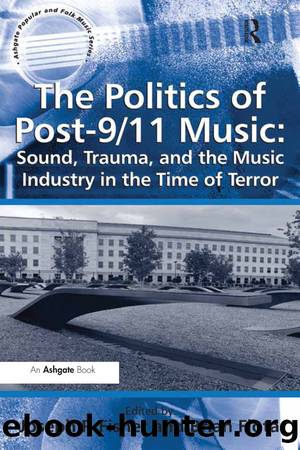The Politics of Post-911 Music: Sound, Trauma, and the Music Industry in the Time of Terror by Brian Flota Joseph P. Fisher

Author:Brian Flota, Joseph P. Fisher [Brian Flota, Joseph P. Fisher]
Language: eng
Format: epub
Tags: Social Science, Anthropology, Cultural & Social
ISBN: 9781409494928
Google: UtOuc1ou4rAC
Publisher: Ashgate Publishing, Ltd.
Published: 2013-01-28T02:52:44+00:00
The Potential
Year Zeroâs final act offers the means through which Reznorâs fictionalized society of control can be interrupted. In simple terms, this act outlines the beginnings of a revolution. The track aptly named âThe Great Destroyerâ assumes the perspective of a subject with âlimitless potentialâ to interrupt the society of control. Similarly, the hopeful âIn This Twilightâ promises something better beyond the dystopic reality of the present tense. Perhaps most dramatically, the albumâs final track, âZero-Sum,â directly addresses the audience and chastises them for allowing the current dystopia to emerge. The audience is shamed for being âjust zeroes and onesâ rather than asserting their own powerful presence in the past. Ultimately, âZero-Sumâ points to us, âreal worldâ citizens that have allowed the dystopia of post-9/11 America to sediment itself in our collective consciousness. In Reznorâs mind, our silence has rendered us as digital code to be manipulated by the mechanisms of control. Here, Reznor recalls Deleuze, arguing that, in a society of control, âcodeâ determines accessibility, while the collective âweâ has been reduced to a statistical data set. As a result, it is fitting that the physical CD on which Year Zeroâs music is coded is a heat-sensitive thermo-chrome disc that reveals a message of ones and zeros, along with copyright information, when it is held for roughly five minutes. Quite literally, data exists beneath the surface of the album. And this data, in all of its multimedia forms, is what opens up The Year Zero Experience, an experience that involves audience participationânot passivityâand which suggests that such participation is the key to avoiding control in all its forms.
It is fitting, therefore, that the ARG relied so heavily on user collaboration. In it, the narrative is interactive, configuring players as archeologists who uncover digital fragments of a future world already past. As such, the intersection between the form and content of The Year Zero Experience speaks to the emergence of a new subjectivity through collaboration and a collective call to action. While the ARG was openly available for anyone who had access to play along, it was also geared toward a specialized demographic consisting of people who could decode messages by cleaning up static; use a spectrometer; maneuver through a great deal of physical and digital information; and, most importantly, effectively collaborate with others in an online environment. This form of collaboration points to a subjectivity based on collective agency rather than individual autonomy, which has historically been the stuff of countercultural activism. Even though these players would work together, the game did not encourage them to submit to the will of the âmassâ or to participate in some empty groupthink exercise. Instead, success in the game demanded that participants learn to collaborate with strangers across national boundaries and under the radar of institutional power, not the least of which was that exerted by Interscope Records.
The engaged collective is what The Year Zero Experience inevitably creates. Rather than standing as a finished product, the physical album stands as merely a
Download
This site does not store any files on its server. We only index and link to content provided by other sites. Please contact the content providers to delete copyright contents if any and email us, we'll remove relevant links or contents immediately.
Spell It Out by David Crystal(36109)
Life for Me Ain't Been No Crystal Stair by Susan Sheehan(35799)
Cecilia; Or, Memoirs of an Heiress — Volume 1 by Fanny Burney(32538)
Cecilia; Or, Memoirs of an Heiress — Volume 2 by Fanny Burney(31936)
Cecilia; Or, Memoirs of an Heiress — Volume 3 by Fanny Burney(31926)
The Great Music City by Andrea Baker(31913)
Professional Troublemaker by Luvvie Ajayi Jones(29648)
The Secret History by Donna Tartt(19034)
We're Going to Need More Wine by Gabrielle Union(19032)
Twilight of the Idols With the Antichrist and Ecce Homo by Friedrich Nietzsche(18618)
All the Missing Girls by Megan Miranda(15929)
Cat's cradle by Kurt Vonnegut(15326)
Pimp by Iceberg Slim(14479)
Bombshells: Glamour Girls of a Lifetime by Sullivan Steve(14046)
For the Love of Europe by Rick Steves(13877)
Talking to Strangers by Malcolm Gladwell(13342)
Norse Mythology by Gaiman Neil(13335)
Fifty Shades Freed by E L James(13229)
The Social Justice Warrior Handbook by Lisa De Pasquale(12183)
